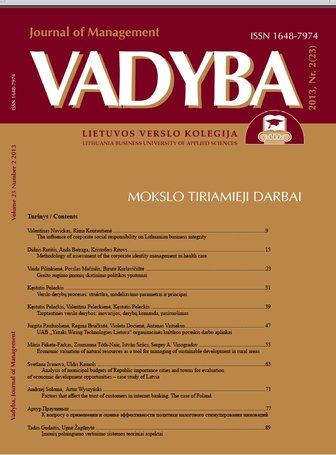К ВОПРОСУ О ПРИМЕНЕНИИ И ОЦЕНКЕ ЭФФЕКТИВНОСТИ ПОЛИТИКИ НАЛОГОВОГО СТИМУЛИРОВАНИЯ ИННОВАЦИЙ
TAX INCENTIVES FOR INNOVATION: SOME ISSUES OF POLICY IMPLEMENTATION AND EVALUATION OF EFFECTIVENESS
Author(s): Artūrs PrauliņšSubject(s): Economy
Published by: Lietuvos verslo kolegija
Keywords: Evaluation; fiscal incentives; innovation; research and development; tax.
Summary/Abstract: Tax incentives for innovative development are widespread throughout the world. In some states, fiscal incentives are not used, although a long discussion about their possible introduction in the future has been held. The article explores the role of tax incentives to promote the innovative development of enterprises. Particular attention is paid to the merits and drawbacks of fiscal incentives, their comparison with financial incentives and to different approaches of evaluating effectiveness. Unlike financial incentives for innovative development, tax incentives are usually more market oriented, are available to a vast majority of enterprises and have relatively inexpensive administration. However, tax incentives are difficult to apply exclusively to the specific sectors of the national economy that could be of vital importance to macroeconomic development. In addition, the amount of uncollected taxes resulting from a more favorable regime for innovative enterprises can not be predicted. No single method of evaluation of fiscal incentives has been developed thus far due to differences in such factors as the national business environment, local culture and economic policy. Nevertheless, the necessity to apply a “cost-benefit” approach to assessment is widely recognised by numerous studies. In practice, the limited availability of required data has led to the exploration of direct additionality. It has been proven that the reaction of enterprises to fiscal incentives is more explicit in the long term. Moreover, enterprises are currently reacting more strongly than they were a decade ago. The impact of fiscal incentives on SMEs is found to be more considerable than it is on large enterprises. The tremendous efforts made by EU institutions towards improving the methodology for evaluating fiscal incentives have resulted in guidelines for better quality and comparability of assessments. Forward planning, clearly formulated goals, unlimited access to statistical information, integrated analysis of additionality, a good variety of appropriate assessment methods and evaluation independence could be mentioned as examples of these recommendations.
Journal: VADYBA
- Issue Year: 23/2013
- Issue No: 2
- Page Range: 77-87
- Page Count: 10
- Language: Russian

